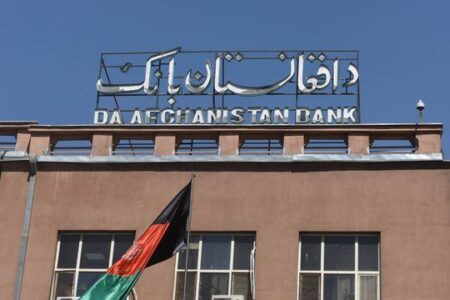
Sanctioned Taliban financier holds leadership post at Afghan Central Bank
Afghanistan’s Taliban government has appointed a man blacklisted by the U.S., the United Nations and the European Union to help lead the country’s central bank, according to people familiar with the matter.
Ahmad Zia Agha, more commonly known in Afghanistan as Noor Ahmad Agha, is a senior Taliban military and financial leader sanctioned for allegedly managing funds intended for bombs and for distributing money to Taliban commanders and associates abroad.
The U.S. has labeled him a specially designated global terrorist. He was appointed five months ago as the first deputy governor of the Da Afghanistan Bank.
As the central bank’s No. 2 official, Mr. Agha is in control of the authority that oversees Afghanistan’s financial sector, including regulations to combat terror-finance and anti-money-laundering rules. His appointment is expected to fuel worries among many Western policy makers about providing the Taliban-run government access to foreign financing, including billions of dollars of funds at the World Bank and $7 billion in foreign currency reserves held in the U.S.
U.S. officials have been in talks with representatives of Afghanistan’s central bank about meeting conditions for some of the reserve funds to be released through the central bank itself, according to U.S. and central bank officials. The U.S. wants guarantees the central bank is operating independently from the Taliban government, is led by technocrats, and its work is overseen by a third party. A key U.S. concern is that the bank has effective, and monitored, anti-money-laundering systems.
“The central bank is fully committed and complying with international regulations of anti-money-laundering and counter-financing terrorism and, as agreed with the U.S., is ready for third-party oversight and for an audit on the process and verification,” a central bank spokesman said in response to a query on Mr. Agha’s appointment.
The central bank’s governor, Haji Mohammad Idrees, also is a senior member of the Taliban government. Since his appointment in August, Mr. Idrees rarely has appeared in public, or publicly weighed in on policy matters.
The terror-designated group’s takeover of Afghanistan following the U.S. pullout in mid-2021 triggered a halt of capital to the country from the private sector, aid groups and other governments, money that is critical for the nation’s economic survival. The U.S. and some Western allies don’t recognize the Taliban as the legitimate government in Kabul, and a previous terror designation of the group saw the government’s assets frozen and financial transactions with the group banned.
Da Afghanistan Bank’s foreign currency reserves were among the funds frozen, money largely managed by the Federal Reserve Bank of New York. The Biden administration has proposed using the funds to provide humanitarian relief to Afghans and to compensate families of victims of the Sept. 11, 2001, attacks.
The U.S. has said it would give aid through humanitarian organizations to help address Afghanistan’s growing economic crisis, and the World Bank has said it would provide grants from its multibillion-dollar Afghanistan Reconstruction Trust Fund.
Mr. Agha’s appointment doesn’t change the legality of dealing with Afghanistan’s central bank, because a general license issued by the U.S. Treasury Department last month allows transactions with Afghanistan’s governing institutions, even if they are led by sanctioned individuals. But such an appointment would make engaging with the central bank much more difficult, said Adam Smith, a partner at law firm Gibson, Dunn & Crutcher LLP who specializes in economic sanctions compliance.
“It just increases the risk profile more than it was before. It adds a wrinkle and a challenge to an already challenging environment,” Mr. Smith said.
The appointment highlights a difficulty with sanctions that many civil society groups could face in Afghanistan, in which they need to ensure a designated individual isn’t the recipient of transactions, said Paul Carroll, director of the Charity & Security Network, a resource and advocacy center for nonprofit organizations.
“Even though [the transactions] might be allowed and the Treasury is saying they are allowed, banks may feel otherwise,” he said.
Mr. Agha’s appointment also created a “terrible optic” for financial institutions or groups dealing with Afghanistan’s central bank, said Adam Weinstein, a research fellow at think tank Quincy Institute for Responsible Statecraft Inc., who supports Afghans having access to their dollar reserves.
The exemptions to the Taliban sanctions are an olive branch from the U.S. to help Afghanistan’s ailing economy, he said. But the Taliban has to meet the U.S. halfway and show it takes anti-money-laundering and combating of terrorist financing obligations seriously, he said.
“For the Taliban to turn around and appoint a designated person to lead the central bank, that shows an absolute disconnect from the reality they are facing,” Mr. Weinstein said. “It’s a slap in the face to the international community.”
Source: WSJ





